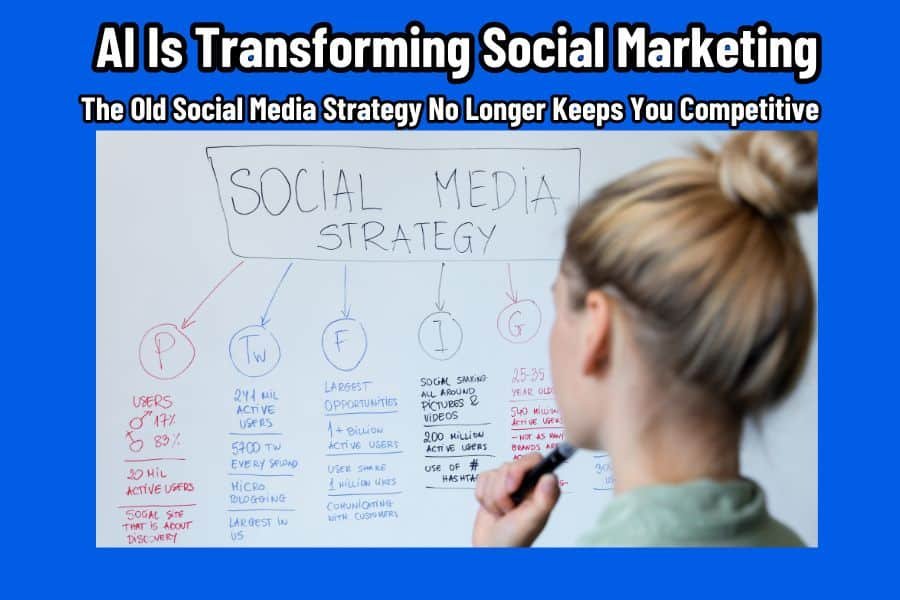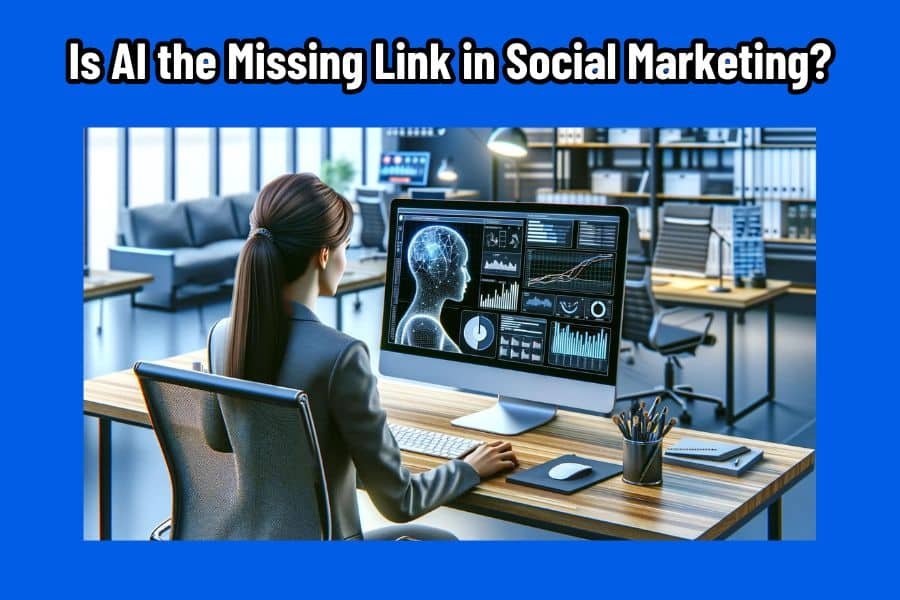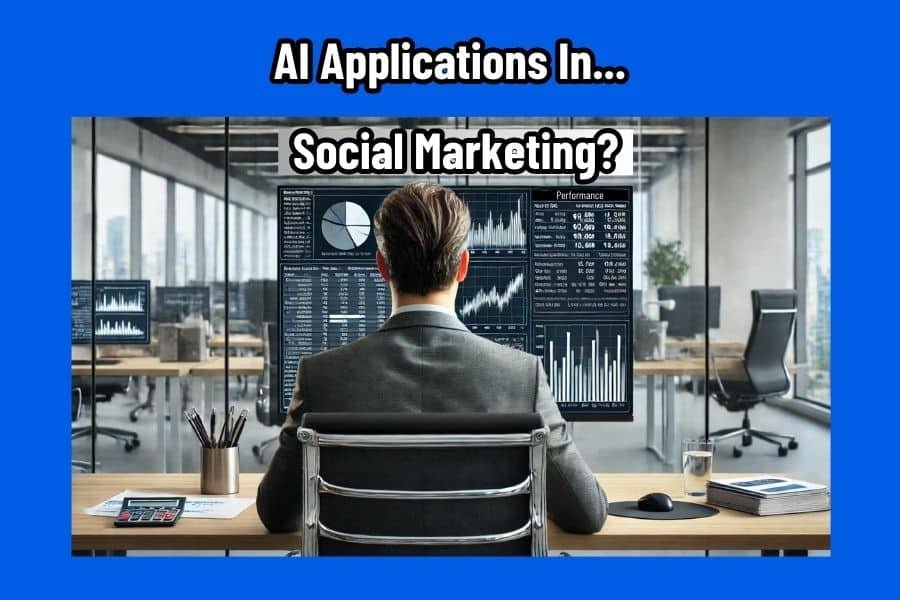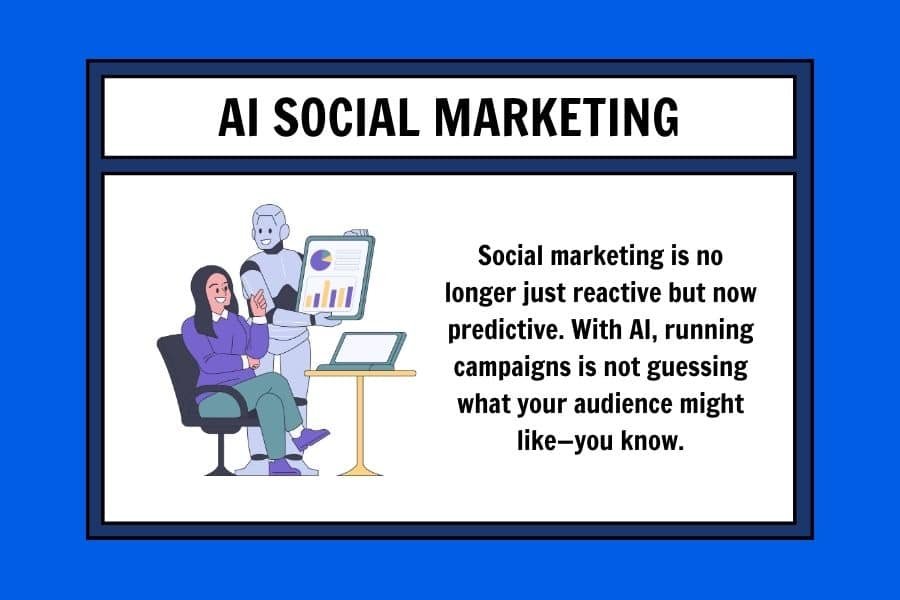Discover how AI is transforming social marketing with personalized content, predictive analytics, and automation, revolutionizing strategies for better results.
Introduction
Imagine a world where social marketing isn’t just reactive but predictive. Where your campaigns don’t just guess what your audience might like—they know. This is the potential of artificial intelligence in social marketing, a game-changing tool that’s redefining how brands connect with their audiences.
This post is for marketers, business owners, and entrepreneurs who want to take their social media strategy to the next level. If you’re tired of feeling like you’re always one step behind your audience, it’s time to learn how AI can automate, optimize, and personalize your efforts in ways that were never possible before. Let’s dive into how this technology is revolutionizing social marketing and how you can make it work for your brand.
The Evolution of Social Marketing

Traditional Social Marketing Strategies
Before the digital age, social marketing was rooted in tried-and-true methods like word-of-mouth, print ads, and community outreach. Brands relied heavily on building relationships through face-to-face interactions, public events, and direct communication with customers. Traditional social marketing strategies were personal, but they lacked the scalability and data insights we take for granted today.
The main focus was on creating buzz in local communities, using television, radio, billboards and online groups to capture the attention of a broad audience. Marketers had to rely on intuition and generic demographic information, making it difficult to accurately measure campaign effectiveness. Despite these limitations, traditional strategies were built on a strong foundation of trust and human connection, something that is still very important in today’s digital world.
The Digital Transformation of Social Media
The advent of social media platforms like Facebook, Twitter, and Instagram changed the game completely. Suddenly, brands could reach a global audience with just a few clicks. Social marketing moved from community bulletin boards to the endless newsfeeds of millions, allowing businesses to engage in real-time conversations with their customers.
However, this digital transformation came with new challenges. As social media grew more crowded and competitive, simply being online wasn’t enough. Marketers needed to adapt to rapidly changing algorithms and customer behaviors. This is where artificial intelligence marketing started to make its mark.
Machine learning in social media began to help brands analyze vast amounts of data, optimize ad spend, and personalize user experiences. Social media automation took over time-consuming tasks like scheduling posts, while predictive analytics in social media allowed businesses to anticipate trends and tailor campaigns accordingly.
The evolution of social marketing—from traditional methods to AI-driven strategies—illustrates how far we’ve come in connecting with audiences. Now, with tools like AI-powered social listening and AI customer segmentation, brands can go beyond just broadcasting a message; they can listen, learn, and respond to their audience in real time.
Is AI the Missing Link in Social Marketing?

What is AI?
Artificial intelligence, or AI, refers to the simulation of human intelligence in machines designed to think, learn, and problem-solve in ways that mimic human cognitive functions. At its core, AI allows systems to analyze massive amounts of data, identify patterns, and make informed decisions with minimal human intervention. In the context of marketing, AI is used to process and interpret customer data, understand consumer behavior, and automate tasks that were previously done manually.
For marketers, AI is not some distant sci-fi concept—it’s already part of our everyday toolkit. From social media automation tools to AI-powered social listening platforms that monitor brand sentiment in real time, AI is helping brands connect with their audience more intelligently and efficiently. But AI can be much more than automation. Many marketers are using AI as a key driver of innovation in their marketing strategies across the board.
How AI is Revolutionizing Marketing
AI is changing the landscape of marketing in profound ways. One of its biggest contributions is the ability to create highly personalized experiences. With AI, brands can now harness data-driven social marketing to tailor messages, ads, and content to individual users based on their behaviors and preferences. This kind of AI content creation doesn’t just save time; it significantly boosts engagement and conversions by offering exactly what the audience wants, when they want it.
Another major shift is the rise of predictive analytics in social media. Marketers no longer need to guess which posts will perform well or which trends to follow. AI can analyze past performance data and predict future outcomes, allowing businesses to make smarter decisions on campaign strategies and ad placements. This not only improves ROI but also gives brands a competitive edge in an increasingly crowded digital marketing space.
Moreover, AI is enhancing customer service with the introduction of social media chatbots. These chatbots can handle everything from answering simple questions to resolving complex customer issues, all while providing a seamless user experience. By automating these interactions, brands can offer 24/7 support without overwhelming their human teams.
In short, AI is not just a tool—it’s a game-changer. By integrating AI into social marketing, businesses are becoming more agile, data-driven, and customer-focused, setting the stage for more impactful and efficient campaigns than ever before. Let’s take a deeper look into AI applications.
AI Applications in Social Marketing

Personalized Content Creation
One of the most powerful ways AI is transforming social marketing is through personalized content creation. AI marketing tools can now deliver tailored content to each individual. This means brands can move away from a one-size-fits-all approach and instead provide posts, ads, and messages that feel unique to each user. For example, AI can determine which type of content—be it videos, blog posts, or infographics—resonates best with different segments of your audience.
By leveraging AI content creation, brands can automatically generate customized messaging at scale, ensuring every interaction feels relevant and personal. This not only increases engagement rates but also fosters a deeper connection between the brand and its audience.
Predictive Analytics for Audience Targeting
Imagine being able to anticipate your audience’s needs before they even know what they want. With predictive analytics in social media, this is now a reality. AI-driven tools analyze historical data, trends, and user behaviors to predict how your audience will respond to certain content or campaigns. By using predictive models, marketers can determine the best time to post, what type of content will perform well, and which audience segments are most likely to convert.
This data-driven approach to social marketing allows for more precise audience targeting, ensuring that brands are not wasting time or resources on ineffective strategies. Whether it’s identifying emerging trends or pinpointing when a customer is ready to make a purchase, predictive analytics gives marketers an edge in crafting campaigns that deliver results.
Chatbots and Customer Service
In today’s fast-paced digital world, consumers expect instant responses. Enter social media chatbots, AI-powered tools that handle customer inquiries 24/7, providing immediate assistance and resolving issues in real-time. These chatbots can handle many different tasks from answering frequently asked questions to assisting with purchases and troubleshooting technical problems.
What makes these AI-driven chatbots so valuable is their ability to learn and improve over time. As they interact with users, they become better at understanding customer preferences and delivering more accurate and helpful responses. This not only improves the customer experience but also frees up human teams to focus on more complex tasks, driving efficiency across the board.
Social Listening and Sentiment Analysis
Another revolutionary application of AI in social marketing is AI-powered social listening and sentiment analysis. These tools allow brands to monitor conversations across social media platforms in real time, analyzing what people are saying about their products, services, or industry. AI can sift through vast amounts of data, identifying trends, uncovering pain points, and tracking shifts in public opinion.
More importantly, AI can interpret the tone and emotion behind these conversations. With sentiment analysis, businesses can determine whether the chatter around their brand is positive, negative, or neutral, allowing them to react swiftly and appropriately. This insight helps marketers understand how their audience feels, allowing them to refine their messaging, improve customer relationships, and even mitigate potential PR crises before they escalate.
By leveraging these AI applications, businesses can stay ahead of the curve, responding to their audience’s needs more effectively and at the same time improve their overall social marketing strategies. Nest, let’s analyze some of the key benefits of using AI in social marketing.
Benefits of AI in Social Marketing
Improved Efficiency and Productivity
One of the most immediate benefits of incorporating AI into social marketing is the dramatic improvement in efficiency and productivity. With AI tools manual tasks like scheduling posts, analyzing performance metrics, curating content, creating funnels and courses and responding to basic customer inquiries can consume valuable time. Reducing these task will save you hours of work and ensure consistent online activity.
AI also enhances productivity by processing large amounts of data far faster than a human ever could. This not only speeds up workflows but ensures more accurate results, enabling teams to operate at maximum efficiency while reducing the risk of human error.
Enhanced Customer Experiences
Today’s consumers expect personalized, timely, and relevant interactions from the brands they engage with. AI helps deliver on these expectations by facilitating personalized content creation, predicting user behaviors, and offering real-time responses through social media chatbots. These chatbots provide immediate customer service, handling queries 24/7, and ensuring a seamless user experience even when human teams are unavailable.
In addition, AI’s ability to analyze customer data and behavior allows entrepreneurs to create hyper-personalized experiences that make users feel understood and valued. Whether it’s recommending products based on past purchases or delivering content tailored to their specific interests, AI ensures that every interaction feels personal, enhancing overall customer satisfaction.
Data-Driven Decision Making
In the world of social marketing, guesswork is no longer necessary. AI empowers businesses to make data-driven decisions by analyzing massive sets of information and uncovering valuable insights. From tracking user behavior to analyzing competitor strategies, AI helps marketers understand what’s working and what isn’t, enabling them to adjust their tactics in real time.
By using predictive analytics for audience targeting, brands can forecast trends, anticipate customer needs, and tailor their messaging accordingly. This not only improves campaign effectiveness but also reduces wasted resources, as businesses can focus their efforts on strategies proven to drive engagement and conversions.
Real-Time Campaign Optimization
In the fast-paced world of social media, real-time campaign optimization is crucial. AI allows marketers to track performance data instantly and adjust strategies as needed, whether it’s tweaking ad spend, shifting content, or refining targeting. This ensures campaigns remain effective and adaptable.
AI tools provide continuous monitoring and feedback, automatically suggesting or making changes like modifying headlines or visuals for better results. By leveraging AI, brands can improve efficiency, enhance customer experiences, and make smarter decisions, all while staying agile in a competitive environment.
Challenges and Considerations
Data Privacy and Ethics
As AI becomes more ingrained in social marketing, concerns around data privacy and ethics come to the forefront. AI-driven tools often rely on vast amounts of personal data to function effectively, such as analyzing user behavior for predictive analytics or offering personalized content. While this improves targeting and customer experience, it also raises important questions about how data is collected, stored, and used.
Consumers are becoming increasingly aware of their digital footprint and how companies use their data. Any misuse or perceived overreach can result in a loss of trust and potentially severe legal consequences. Businesses must navigate regulations like GDPR and CCPA, which dictate strict guidelines on data collection and user consent. Marketers using AI must prioritize transparency, ensuring that customers understand how their data is being used and offering them the option to opt out.
Balancing the need for data with respect for privacy is one of the most significant ethical challenges in AI-powered social marketing.
Integration with Existing Systems
While AI offers incredible opportunities, integrating these advanced technologies into existing marketing systems is often easier said than done. Many companies rely on a range of marketing tools, CRMs, and analytics platforms, and adding AI into the mix can create compatibility issues. Integrating AI with existing systems requires a strong technological infrastructure and often demands upgrades to existing tools to support AI capabilities like AI-powered social listening or AI customer segmentation.
Another challenge is training the marketing team to use AI tools effectively. Although AI automates many tasks, it still requires human oversight to ensure it’s aligned with the overall marketing strategy. Businesses must invest in both technology and skill development to smoothly incorporate AI into their operations. The learning curve can be steep, but when successfully integrated, AI significantly enhances the value of traditional marketing systems.
The Human Touch: Balancing AI and Creativity
One of the biggest concerns marketers have when adopting AI is the fear of losing the human touch. AI excels in data-driven decision-making, automating processes, and improving efficiency, but creativity and emotional connection remain uniquely human traits. In social marketing, creativity is often what sets a brand apart, and there’s a valid worry that over-reliance on AI could make marketing feel robotic or impersonal.
The key is striking the right balance between AI and human creativity. AI can handle data-heavy tasks like predictive analytics or optimizing content for engagement, but it’s up to marketers to inject personality, storytelling, and emotion into the mix. The best social marketing strategies use AI as a tool to enhance creativity, not replace it. Balancing automation with authenticity ensures that campaigns are not only efficient but also emotionally engaging.
In the end, while AI provides a wealth of tools to streamline and enhance social marketing, the creative human touch, (you) remain an irreplaceable asset that brings a brand’s message to life.
The Future of AI in Social Marketing

Emerging Trends
AI’s evolving role in social marketing is driven by emerging trends that are transforming audience engagement. One key trend is the increasing use of machine learning in social media, where algorithms predict user behavior and optimize content delivery in real time. This ensures that the right content reaches the right audience with minimal manual input, maximizing relevance and impact.
Another major development is the rise of AI-powered social listening. These advanced tools go beyond simple keyword tracking, understanding context and detecting emotions to anticipate shifts in consumer sentiment. By staying ahead of trends, brands can proactively adjust their messaging and strategies to maintain a competitive edge.
Furthermore, AI content creation is evolving into sophisticated personalized storytelling, creating hyper-targeted campaigns based on real-time user data. Paired with AI customer segmentation, brands can now target highly specific audience segments with engaging narratives and enhanced social media personalization. This results in social marketing strategies that are more dynamic, personalized, and precise than ever before.
Preparing for an AI-Driven Social Marketing Landscape
The rise of AI in social marketing is already underway, and to stay competitive, brands must invest in the right technologies and understand how to leverage AI effectively. Embracing data-driven social marketing is crucial, as AI thrives on data. Companies with strong data collection and analysis systems are better equipped to utilize AI tools, from predictive analytics to AI-driven chatbots that streamline customer interactions.
Businesses must also prioritize upskilling their teams. While AI can automate technical tasks, marketers are still essential for overseeing strategy, creativity, and ethics. Training teams to use AI effectively ensures a smooth transition into AI-powered marketing.
Lastly, it’s important to balance automation with human creativity. AI enhances efficiency, but creativity, storytelling, and emotional connection are still key to successful social marketing. Brands that invest in AI technology while fostering human creativity will not just keep up—they’ll lead the way in the evolving landscape.
FAQs: Social Marketing
Why should entrepreneurs start using AI in their social marketing?
Today, entrepreneurs must use AI in social marketing to be competitive. With AI you can boost efficiency, personalize customer experiences, and gain valuable insights. AI automates tasks like content scheduling and customer support, freeing up time for strategic growth. With predictive analytics and AI-powered tools, entrepreneurs can target the right audience, optimize campaigns, and increase engagement. By leveraging AI, you can reduce costs, improve ROI, and unlock greater profit potential.
How is AI transforming social marketing?
AI is revolutionizing social marketing by automating tasks, improving personalization, and providing data-driven insights. With AI, marketers can use tools like AI-powered social listening to monitor brand sentiment, predictive analytics to target the right audience, and AI content creation to develop personalized messaging at scale. These technologies are helping brands deliver more relevant content, optimize campaigns in real time, and create a more engaging and efficient social media presence.
What are the main benefits of AI in social media marketing?
The benefits of AI in social media marketing are vast. First, AI improves efficiency by automating repetitive tasks like content scheduling and data analysis. It also enhances customer experiences through the use of social media chatbots, offering instant support and personalized interactions. AI’s ability to process large amounts of data means that marketers can make smarter, data-driven decisions, leading to more successful campaigns. Finally, AI enables real-time campaign optimization, allowing brands to tweak strategies on the fly for better performance.
Can AI replace human creativity in social marketing?
No, AI cannot fully replace human creativity. While AI excels at automating processes and analyzing data, it lacks the emotional intelligence and unique creativity that humans bring to marketing. AI can handle the technical aspects, such as personalizing content or optimizing campaigns, but human marketers are still essential for developing compelling stories, engaging visuals, and innovative strategies. The future of social marketing lies in balancing AI with human creativity, ensuring that technology enhances, rather than replaces, the creative process.
How does AI help with customer segmentation in social marketing?
AI enhances customer segmentation by analyzing vast amounts of data to group users based on behaviors, preferences, and demographics. Traditional segmentation methods often rely on broad categories like age or location, but AI can create hyper-targeted segments in real time. This means that brands can tailor their messages to specific groups with high accuracy, leading to better engagement and more effective campaigns. For example, AI can identify users who are most likely to convert based on their interaction history, allowing marketers to focus their efforts on high-potential leads.
What are the ethical concerns surrounding AI in social marketing?
Social Marketing with an All-In-One Digital Marketing Platform: [JOIN HERE FOR FREE]





